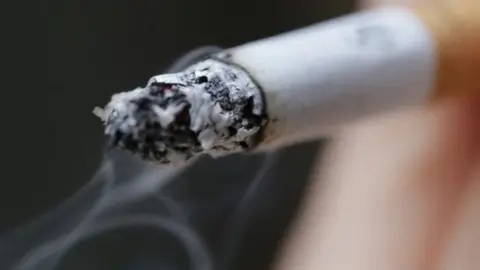Will Rishi Sunak's plan to ban smoking in UK work?

 Reuters
ReutersPrime Minister Rishi Sunak has described his plan to phase out the sale of cigarettes as the "biggest public health intervention in a generation".
The policy, if it gets the backing of MPs, will see the age at which people can buy tobacco products - currently 18 - increase by a year each year. It would mean today's 14-year-olds would never be able to purchase a cigarette.
The idea certainly seems a simple solution to what is after all an incredibly damaging habit. Smoking is the leading cause of preventable ill health - or put another way - around half of long-term smokers can expect it to kill them.
But the problem comes when you think about the mechanics of how it will work in practice.
No country in the world had done this. New Zealand has passed a law to introduce it but it will be another four years before it really starts kicking in and an adult is legally unable to buy a tobacco product.
But while an 18-year-old will not be allowed, their 19-year-old friend will be. And that is the issue, say the critics of this policy, including the Institute of Economic Affairs and smokers' lobby group Forest.
How can an arbitrary line be drawn, making something illegal just because a person was born in a different year? Surely an illicit trade in cigarettes will ensue? And what about policing it?
After all under Rishi Sunak's plan, which he wants to work with the devolved nations to introduce UK-wide, we will have a situation in 20 years' time where a couple aged 34 and 35 could be living together and one can buy cigarettes and one cannot.
Of course, once back home there is nothing to stop the 34-year-old reaching over and taking a cigarette from their partner and lighting up.
But in a way that is not the point. Sources at the Department of Health and Social Care, which has been looking at the policy since it was put forward in a government-commission review by former Barnardo's chief executive Javed Khan last year, say the intention is not to criminalise the act of smoking rather the sale of products by retailers.
It will be a job for trading standards to enforce rather than the police to crack down on.
And so far, Labour are not seeking to oppose it, while the Welsh and Scottish governments are makingpositive noises too, our political editor Chris Mason says.
Learning from New Zealand
The point of the policy, says Dr Sarah Jackson, part of the tobacco and alcohol research group at University College London, is not to ban smoking outright but to further de-normalise and so "discourage" young people from taking it up.
She says there is good evidence that increasing the age of sale is effective in reducing smoking rates, pointing out that the increase in the legal age of sale from 16 to 18 in 2007 has contributed to the falls seen since then.
But what is also clear from New Zealand's lead is that increasing the age of sale should be seen as just a part of a package of measures.
Alongside the age change, New Zealand is also reducing the nicotine content of cigarettes and restricting where they can be sold.
University of East Anglia addiction expert Prof Caitlin Notley says the age of sale policy cannot just be brought in in isolation.
She says there must be more funding for stop smoking services and innovation to reach out to those parts of society that have the greatest needs.
"It is the poorest and most deprived people in our society who continue to smoke tobacco at the highest rates. Tobacco smoking is an inequalities issue," she says.
Funding cuts
And this is where the problem lies. Running stop smoking services is the role of public health teams which sit in councils.
But they saw big cuts to their budgets by central government between 2015 and 2020 - forcing them to trim a third off their funding for stop smoking services, according to the Health Foundation. Although the government says the money available has since increased.
The squeeze also had a damaging impact in other areas of public health too, with drug and alcohol, sexual health and obesity services also impacted.
 Getty Images
Getty ImagesAnd while health experts are pleased with the announcement on smoking, there is real frustration about the approach taken to obesity, which is estimated to cost the NHS twice the £3bn a year spent dealing with the ill-health caused by smoking.
That is why some research has suggested obesity is now an even bigger threat to the health of the nation than smoking - while smoking rates have declined four-fold since the 1970s, obesity rates have gone in the opposite direction.
A report published this year by the Institute for Government accused the government - and indeed its predecessors - of ducking the difficult decisions.
With the exception of the sugar tax on soft drinks which was introduced in 2016, it said more ambitious policies have been "avoided or delayed" such as tighter restrictions on advertising and promotions for junk food.
